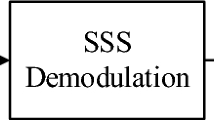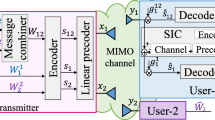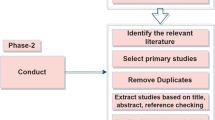Abstract
Exploiting cooperation of mobile stations (MSs) for content distribution has been considered as a promising approach to offload the rapidly growing traffic demand in cellular networks. This paper proposes a framework of MSs’ energy-efficient cooperation for distributing realtime content blocks (CBs). Given a group of MSs interested in downloading a set of CBs from the cellular base station (BS), we propose a cooperative scheme in which, the BS first unicasts the CBs to some selected MSs, who then relay their received data to other MSs such that all MSs can receive their required CBs. Regarding this cooperative scheme, we aim at jointly optimizing each CB’s transmission rate and each MS’s relay-strategy (namely, relaying which subset of CBs and for how long), such that the total energy consumption of the BS and all MSs can be minimized. Such an optimization problem is challenging to solve, since the CBs’ transmission rates significantly influence the MSs’ relay-strategies. To tackle this difficulty, we explore the layered structure of the formulated optimization problem and propose a corresponding layered algorithm (including a top-layer algorithm and a bottom-layer algorithm) to compute the optimal solution. Numerical results are provided to validate our proposed algorithm and show the performance advantages of our proposed scheme for the MSs’ cooperative content distribution.








Similar content being viewed by others
Notes
References
Tehrani M, Uysal M, Yanikomeroglu H (2014) Device-to-device communication in 5G cellular networks: challenges, solutions, and future directions. IEEE Commun Mag 52(5):86–92
Wu Y, Wang J, Qian L, Schober R (2015) Optimal power control for energy efficient D2D communication and its distributed implementation. IEEE Commun Lett 19(5):815–818
Camps-Mur D, Garcia-Saavedra A, Serrano P (2013) Device-to-device communications with WiFi direct: overview and experimentation. IEEE Wirel Commun 20(3):69–104
Lei L, Zhong Z, Lin C, Shen X (2012) Operator controlled device-to-device communications in LTE-advanced networks. IEEE Wirel Commun 19(3):96–104
Han B, Hui P, Kumar VS, Marathe M, Pei G, Srinivasan A (2010) Cellular traffic offloading through opportunistic communications: a case study. In: Proceedings of the 5th ACM workshop on challenged networks, pp 31–38
Li Y, Qian M, Jin D, Hui P (2014) Multiple mobile data offloading through disruption tolerant networks. IEEE Trans Mobile Comput 13(7):1579–1596
Gao W, Li Q, Zhao B, Cao G (2009) Multicasting in delay tolerant networks: a social network perspective. In: Proceedings of the tenth ACM international symposium on Mobile ad hoc networking and computing, pp 299–308
Chuang Y, Lin K (2012) Cellular traffic offloading through community based opportunistic dissemination. In: Proceedings of 2012 IEEE wireless communications and networking conference, pp 3188–3193
Yang T, Cheng N, Yu C, Feng H, Shen X (2015) Knowing who and when to deliver an optimal stopping method for maritime data scheduling. In: Proceedings of 2015 IEEE international conference on communications (ICC), pp 3837–3842
Stiemerling M, Kiesel S (2010) Cooperative P2P video streaming for mobile peers. In: Proceedings of 19th international conference on computer communications and networks (ICCCN), pp 1–7
Al-Kanj L, Dawy Z, Saad W, Kutanoglu E (2013) Energy-aware cooperative content distribution over wireless networks: optimized and distributed approaches. IEEE Trans Veh Technol 62(8):3828–3847
Al-Kanj L, Poor V, Dawy Z (2014) Optimal cellular offloading via device-to-device communication networks with fairness constraints. IEEE Trans Wirel Commun 13(8):4628– 4643
Leung MF, Chan SHG (2007) Broadcast-based peer-to-peer collaborative video streaming among mobiles. IEEE Trans Broadcast 53(1):350–361
Peng M, Wang W (2008) Investigation of cooperative relay node selection in heterogeneous wireless communication systems. In: Proceedings of IEEE international conference on communications workshops, pp 174–178
Madan R, Mehta N, Molisch A, Zhang J (2008) Energy-efficient cooperative relaying over fading channels with simple relay selection. IEEE Trans Wirel Commun 7(8):3013–3025
Hua S, Guo Y, Liu Y, Liu H, Panwar S (2011) Scalable video multicast in hybrid 3G/Ad-hoc networks. IEEE Trans Multimedia 13(2):402–413
Chen J, Xu W, He S, Sun Y, Thulasiramanz P, Shen X (2010) Utility-based asynchronous flow control algorithm for wireless sensor networks. IEEE J Sel Areas Commun 28(7):1116–1126
Vu L, Nahrstedt K, Rimac I, Hilt V, Hofmann M (2010) iShare: exploiting opportunistic Ad Hoc connections for improving data download of cellular users. In: Proceedings of 2010 IEEE GLOBECOM Workshops (GC Wkshps), pp 1475–1480
Xu Q, Su Z, Han B, Feng D, Xu Z, Gan X (2016) Analytical model with a novel selfishness division of mobile nodes to participate cooperation. Peer-to-Peer Netw Appl 9(4):712–720
Wang K, Lau F, Chen L, Schober R (2015) A distributed market framework for mobile data offloading. In: Proceedings of 2015 IEEE international conference on communications (ICC), pp 3063–3068
Zhang Y, Guizani M (2011) Game theory for wireless communications and networking. CRC Press
Wu Y, Zhang T, Tsang D (2011) Joint pricing and power allocation for dynamic spectrum access networks with Stackelberg game model. IEEE Trans Wirel Commun 10(1):12–19
Niyato D, Hossain E (2008) A game theoretic analysis of service competition and pricing in heterogeneous wireless access networks. IEEE Trans Wirel Commun 7(12):5150–5155
Wu Y, Zhu Q, Huang J, Tsang D (2014) Revenue sharing based resource allocation for dynamic spectrum access networks. IEEE J Sel Areas Commun 32(11):2280–2297
Gao L, Iosifidis G, Huang J, Tassiulas L (2014) Hybrid data pricing for network-assisted user-provided connectivity. In: Proceedings of 2014 IEEE INFOCOM, pp 682–690
Gao L, Iosifidis G, Huang J, Tassiulas L, Li D (2014) Bargaining-based mobile data offloading. IEEE J Sel Areas Commun 32(6):1114–1125
Wu Y, Chen J, Qian L, Huang J (2015) Energy-aware cooperative traffic offloading via device-to-device cooperations: an analytical approach. IEEE Trans Mobile Comput. 10.1109/TMC.2016.2539950
Keller L, Le A, Cici B, Seferoglu H, Fragouli C, Markopoulou A (2012) MicroCast: cooperative video streaming on smartphones. In: Proceedings of he 10th international conference on mobile system, applications, and services, pp 57–70
Li G, Xu Z, Xiong C, Yang C, Zhang S, Chen Y, Xu S (2011) Energy-efficient wireless communications: tutorial, survey, and open issues. IEEE Wirel Commun 18(6):28–35
Ismail M, Zhuang W, Serpedin E, Qaraqe K (2015) A survey on green mobile networking: from the perspectives of network operators and mobile users. IEEE Commun Surv Tutorials 17(3):1535–1556
Li Y, Jiang Y, Jin D, Su L, Zeng L, Wu D (2010) Energy-efficient optimal opportunistic forwarding for delay-tolerant networks. IEEE Trans Veh Technol 59(9):4500–4512
Zhang Y, He S, Chen J (2015) Data gathering optimization by dynamic sensing and routing in rechargeable sensor networks. ACM/IEEE Trans Netw 24(3):1632–1646
Zhang H, Cheng P, Shi L, Chen J (2016) Optimal DoS attack scheduling in wireless networked control system. IEEE Trans Control Syst Technol 24(3):843–852
Ng D, Lo E, Schober R (2013) Energy-efficient resource allocation in multiuser OFDM systems with wirelss information and power transfer. In: Proceedings of IEEE wireless communications and networking conference, pp 3823–3828
Acknowledgments
The authors would like to thank Professor Jianwei Huang in the Chinese University of Hong Kong and Professor Xuemin (Sherman) Shen in University of Waterloo helpful discussions about the topic of mobile data offloading in cellular networks. This work is supported in part by the National Natural Science Foundation of China (61303235, 61572440, 61379122), the Zhejiang Provincial Natural Science Foundation of China (LR17F010002, LR16F010003) and the Young Talent Cultivation Project of Zhejiang Association for Science and Technology (2016YCGC011).
Author information
Authors and Affiliations
Corresponding author
Rights and permissions
About this article
Cite this article
Chen, J., Wu, Y., Qian, L.P. et al. Energy-efficient content distribution via mobile users cooperations in cellular networks. Peer-to-Peer Netw. Appl. 10, 750–764 (2017). https://doi.org/10.1007/s12083-016-0519-3
Received:
Accepted:
Published:
Issue Date:
DOI: https://doi.org/10.1007/s12083-016-0519-3




